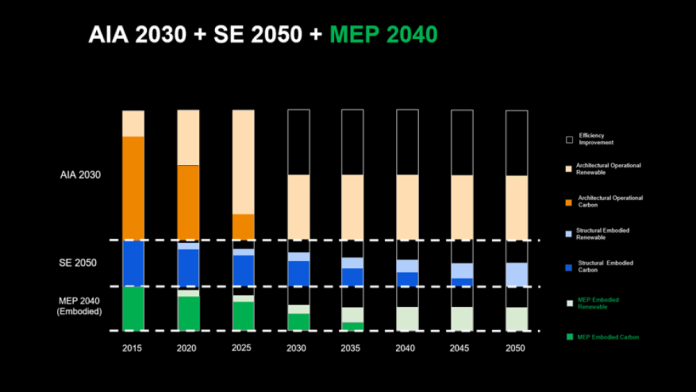ULI is proud to announce that we have joined MEP 2040 as a supporting organization. MEP 2040 is a movement to radically reduce total carbon emissions associated with Mechanical, Electrical, and Plumbing (MEP) systems through collective action. “The embodied carbon associated with MEP systems is a burgeoning topic in real estate ESG. ULI is proud to support MEP2040 in its efforts to radically reduce total carbon emissions associated with building systems. We applaud the work of MEP engineering and design firms who have made the MEP2040 commitment and urge the broader industry to join the movement and advance real estate’s journey to net zero,” said Marta Schantz, Co-Executive Director of ULI’s Randall Lewis Center for Sustainability in Real Estate.
MEP 2040 was developed as a data-driven commitment for engineering firms to work towards total life cycle decarbonization, including both embodied carbon and operational carbon. The effort’s mission is to reduce the carbon emissions associated with MEP systems dramatically. MEP decarbonization is key because while it’s well known that buildings generate 40 percent of global carbon emissions annually, operational carbon makes up approximately 30% of annual global greenhouse gas emissions, and embodied carbon adds up to 10% to these emissions. MEP systems are directly related to operational carbon, but also linked to embodied carbon emissions via system manufacturing and transportation.
Shanti Pless, senior research engineer at the National Renewable Energy Laboratory said, “MEP systems in our buildings account for both large operational emissions and upfront embodied emissions. The MEP 2040 initiative challenges the designers of these MEP systems to advocate for and achieve net zero carbon in their projects. The initiative also provides a commitment framework to ensure the appropriate planning and data is collected, while asking that low global warming potential refrigerants are used. Many MEP firms have signed up to the MEP 2040 Commitment, and they will be valuable partners in the Real Estate industry’s push to decarbonize the built environment.”
Historically, the industry has excluded mechanical equipment, delivery, refrigerants, and refrigerant leaks from life cycle analysis studies, which means there is not a clear picture of the exact impact of these systems. One explanation is MEP products often don’t yet have Environmental Product Declarations, making measuring the embodied carbon difficult, if not impossible. As manufacturers and suppliers across the entire real estate value chain are encouraged to produce EPDs, there are also efforts to measure the impact of low global warming potential refrigerants, plus the push to understand the carbon impact of materials that route between equipment such as pipes, ducts, conduits, etc.
These efforts, along with the MEP 2040 initiative as a whole, support the need to completely decarbonize the built environment, including all components no matter how large or small. MEP 2040 is similar to AIA’s Architecture 2030 Commitment, which challenges architects to design more energy-efficient buildings, and SE 2050, which is a similar program for structural engineers. The chart below illustrates the respective contributions of all three commitments and their areas to a comprehensive carbon solution.
(Source: Carbon Leadership Forum / “About MEP and Carbon”)
For the industry to truly achieve zero carbon emissions, it will require all of these aspects of design and construction of buildings to work together. ULI is proud to support this effort and provide guidance to our members about embodied carbon through a variety of initiatives. If you have any questions or would like to engage please reach out to [email protected].
urbanland.uli.org
https://urbanland.uli.org/resilience-and-sustainability/carbon-reductions-dont-stop-at-the-front-door















